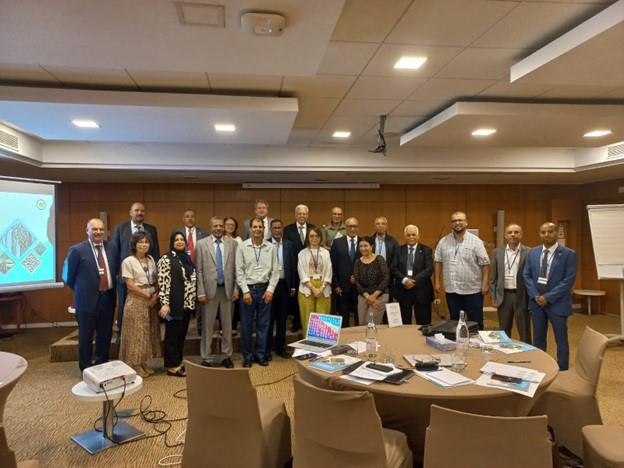A roadmap for promoting biosaline agriculture in the Maghreb countries

13 June 2023, Tunis – Within the framework of the FAO Regional Initiative on Water Scarcity (WSI), and FAO-UMA programme 2020-2023, the FAO sub-regional office for North Africa, in collaboration with the Arab Maghreb Union (UMA) and the International Center for Biosaline Agriculture (ICBA), organized a sub-regional workshop to discuss the results of a study developed to identify challenges and opportunities of biosaline agriculture and propose a vision and roadmap for promoting biosaline agriculture in the Maghreb countries.
This sub-regional workshop was followed by the eleventh session meeting of the Permanent Committee of UMA on combating desertification, environment protection and sustainable development.
During the opening session, facilitated by Misbah Al-Mabrouk, Director of the Food Security Department of UMA, the General Secretary of UMA, Taieb Baccouche highlighted the importance of the subject and timeliness, and expressed appreciation to FAO for providing this opportunity to promote biosaline agriculture and all participants for their commitment to find optimal orientations for sustainable agricultural development and environment protection in the changing context of climate.
Philippe Ankers, coordinator of the FAO sub-regional office for North Africa, recalled the increasing volume of saline water in the Maghreb region and the technological opportunities for the development of the biosaline agriculture under the facilitation of UMA.
Khalil Ammar, a representative from ICBA, highlighted the core mission of ICBA in supporting countries for the promotion of biosaline agriculture and appreciated the positive collaboration with FAO sub-regional office for North Africa and UMA that allows favorable conditions for the development of biosaline agriculture in the Maghreb region.
Jamel Kailene, representative of the Ministry of Agriculture, Water Resources and Fisheries of Tunisia, welcomed the participants and recalled the importance of the development of saline water resources in the context of water scarcity in Tunisia and in the region.
The participants, composed of the official delegates from Maghreb countries and thematic experts, discussed the results of the study that provided a baseline of biosaline agriculture in the sub-region, a comparative analysis of challenges and opportunities as well as a vision and roadmap for promoting biosaline agriculture in five Maghreb Countries: Algeria, Libya, Mauritania, Morocco, and Tunisia.
The study highlights some salt-affected areas in Maghreb countries, their characteristics, forms of adaptation to the constraints and opportunities for saline environment, and the potential for sustainable agricultural production in the future. It demonstrates the potential for utilizing local and adapted halophytic species by adopting a biosaline agriculture approach with the proposition of solutions for restoring biodiversity and productivity in salt-affected areas in Maghreb countries.
The Permanent Committee of UMA on Combating desertification, environment protection and sustainable development has approved the draft of the proposed vision and roadmap and advised the UMA General Secretariat to circulate the outcome of the meeting to all member states.
